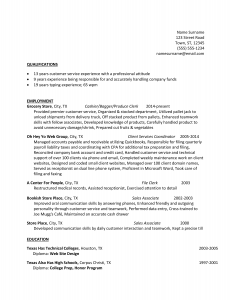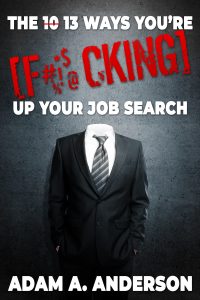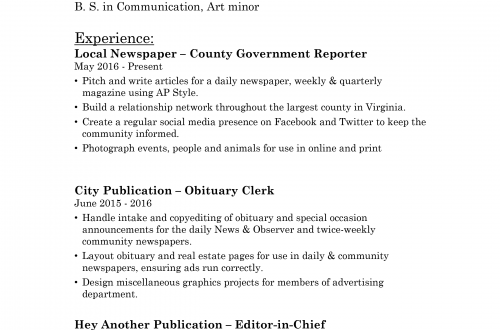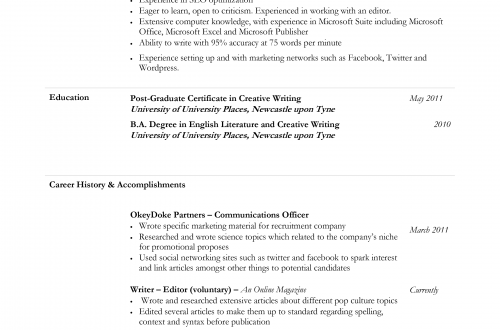Our next brave adventurer into the land of resume critiques is a clerk and cashier at an international grocery chain. Let’s take a look at his resume:
 |
Click to enlarge.
What You Did Right
- One-page resume. I love a good one-pager, and you accomplished this neatly with plenty of white space and no cramming. Good job.
- Action verbs. Go you! Almost every last one of your not-quite-sentences starts with an action verb, and you vary it up pretty well.
- Clean, easy-to-read sans serif font. For you font snobs reading: yes, it’s Calibri 11.5. Yes, that’s a good thing. Calibri is a simple, professional font with a touch of personality – and if you want to gripe about it just because it’s the Microsoft default, take the stick out of your goddamned ass and stop trying to be elitist over unimportant trash things. Yes, I love fonts. Yes, I’m also a designer. No, I wouldn’t use Calibri in a graphic design. But this isn’t a graphic design. It’s a resume, and readability trumps everything. Calibri is highly readable, so please, please stop this campaign of “I wouldn’t use it because it’s the Microsoft default” when that makes you sound like a teenager refusing to do something because the popular kids do it. (Sorry, my darling cashier. You got caught up in that little rant. You did good.)
What You Did Wrong
- Confusing opening summary. I’m really not sure what this summary is trying to convey, or how many years of experience you actually have in total. You shouldn’t break down years of experience in individual things this way; there’s a time and a place to do that, but you don’t need it. Just show your overall career length, and focus more on concrete abilities instead of calling out these specific minutiae. Your summary should be a high-level statement pitching who you are as a professional in sum total.
- Irrelevant information in the opening summary. Your typing experience really doesn’t matter toward your career goal unless you’re trying out for a position where that matters, such as secretary, admin assistant, or court stenographer. Even then, you wouldn’t list your years of experience typing at that speed. You’d just list your typing speed and be done with it.
- Unclear goal. I’m not sure what you’d use this resume to apply for. Generally the summary clarifies that, but this one doesn’t. Your resume needs a clear goal, meaning you need to focus on what kind of positions you’d target and slant your resume toward that. A title often helps this, as well, instead of just labeling it “Qualifications.” If you’re not sure and just intend to keep a generic resume, I…honestly wouldn’t? Generic resumes don’t do anything for anyone. Instead let’s say you’re a cashier right now, and you’d be open to a position as cashier elsewhere but also would like to get back into a leadership role in client services. Make two resumes. One with the header title Customer Service Specialist, and one with the header title Client Services Coordinator. Write different summaries for each one, focusing on specific strengths in that target area. For the customer service resume, trim the Client Services Coordinator position down and expand on the Cashier / Bagger / Product Clerk and Sales Associate positions. For the Client Services Coordinator resume, do the opposite: put a little more meat on that File Clerk position, spruce up the Client Services Coordinator position, and cut everything else down to 1-2 lines.
- No searchable skill keywords. You need a bullet-based list of Core Competencies or Areas of Expertise right underneath your opening summary, before your experience. This helps you pass automated text scanners by populating it with key phrases taken from target job descriptions, but it also lets employers get a quick idea of your skills at a glance. (Hint hint: you could put your typing speed in this list and focus on something more weighty in your opening summary.)
- Large blocks of texts with no bullets. You should absolutely have some form of bullets in this resume, whether everything is bullet-based or you list your duties as a paragraph, achievements as bullets. Large blocks of text blend into this featureless wall of pointillism art that loses all meaning; people can lose their place easily, but it’s not nearly as easy to find it again. Text walls look like infodumps that no one wants to read. Bullet points help you pass the 10-second test with easy, scannable text. As an aside, there’s also a part with Oh Hey Yo Web Group where you say “Proficient in Microsoft Word.” That’s not a job duty. That’s a skill. It doesn’t belong there.
- Use of the word “responsible.” Believe it or not, this word is a resume-killer. It’s boring and makes your work actually sound like work, instead of like something you were actively engaged in. Don’t use it. Ever.
- Extremely long run-on paragraphs separated by commas instead of periods. Every last one of your job descriptions is a single paragraph, yet what it looks like is multiple short sentences strung together by commas, including the beginning of each clause starting with a capital letter as though it’s in sentence case. This doesn’t make sense and isn’t a typical grammatical structure, so the reader will be more focused on puzzling that out than on actually absorbing the information. Replace those commas with periods. You’re also missing a period at the end of those text blocks, so it just cuts off midair and leaves us hanging.
- No achievements. You haven’t called out a single achievement, and you need achievements – preferably with metrics – to impress employers. They don’t want people who just showed up and did the work. They want people who made a difference. I know in certain lines of work it’s hard to really stand out because there are no opportunities, but you can find ways to at least look good on paper. For instance, you can say that you improved customer retention by continuously providing top-level service and encouraging repeat business. However, “Improved oral communication skills by answering phones” isn’t an achievement. It can actually count against you, because you’re leading off with that job at Bookish Store Place by saying “I wasn’t that great to start with, but I got better. On company time.” The same can be said for the line about enhancing teamwork skills with fellow associates; you could turn this around and instead say that you improved team collaboration and productivity by fostering teamwork. Do something similar with developing knowledge of products. Employers really don’t want to be reminded of how much they’ll have to train you, or feel that you’ll be inept until they do.
- Bland, messy format lacking clear delineation. Your format is pretty dull and could work just as well in Notepad. I like simple, but not this simple. Your headers are so minimalistic that your job titles actually disappear. Your left alignment makes for jagged edges on the right, where your dates seem to float back and forth instead of being hard right aligned – and not just because I changed the company names, as they were pretty off-kilter even before that – and the dates on your education even seem to be breaking past the right margin. The entire thing needs some differentiation with larger font sizes for headers, a clearer structural breakdown, separator lines, justified text, bullet points. (P.S. There’s a little inconsistency there, too. You have a blank line after the headers for Qualifications and Education, but not after the header for Employment.)
- Confusing degree listing. Your degree says “Diploma: Web Site Design.” What kind of diploma was it? Associate’s? Bachelor’s? If it was literally a diploma, write it as Diploma in Website design. Otherwise it looks like you’re trying to hide either not completing a degree, or having an Associate’s that you’re ashamed of vs. a Bachelor’s. (Protip: It’s nothing to be ashamed of. You can do a fuckton with the knowledge in a Diploma or Associate’s program, and often they’re accelerated vocational versions of Bachelor’s programs offering just as much educational growth.)
- High school diploma in education. …bb. Why. Why. You have a completed degree and over 10 years of work history. Why is your high school diploma in here? This is only relevant for people still in high school or people looking for a job with no intention of going to college, but also no work history. There is never any other reason to include your high school diploma.
- RTF format. Of course readers can’t see this by the image, but this file was sent to me in RTF format. If you have the capability to save it as a Word doc, do so by any means necessary. RTF is outdated and should only be a last-ditch resort.
Honestly, your information is there, it’s mostly the format and lack of achievements sabotaging you. Clean up your format with more structure. Find something nice to say about yourself. You can do this, boo boo. You can do this.
You’ve absolutely got this.
– Adam
Want your resume critiqued? Head here and follow the instructions.
 Learn more about how to write a better resume in THE 13 WAYS YOU’RE F*CKING UP YOUR JOB SEARCH.
Learn more about how to write a better resume in THE 13 WAYS YOU’RE F*CKING UP YOUR JOB SEARCH.
No one likes being called a fuckup, but I’d bet you like being a fuckup even less. Get more extensive how-to advice on cleaning up your job search game, sprucing up your resume, tackling interviews, changing career paths, discussing salary negotiations, how not to be an utter shit in the workplace, and more with 300+ pages of advice mixed with vitriol, anecdotes, and a few questionable comments that made my editor say “…seriously, Adam? Why.”
$4.99 on Amazon | Free on KindleUnlimited


